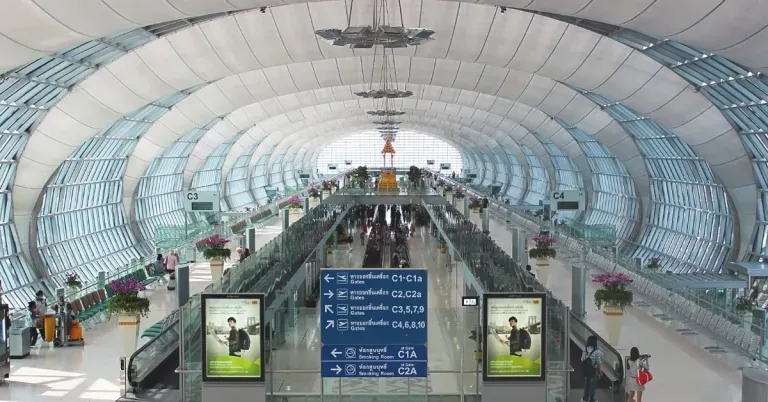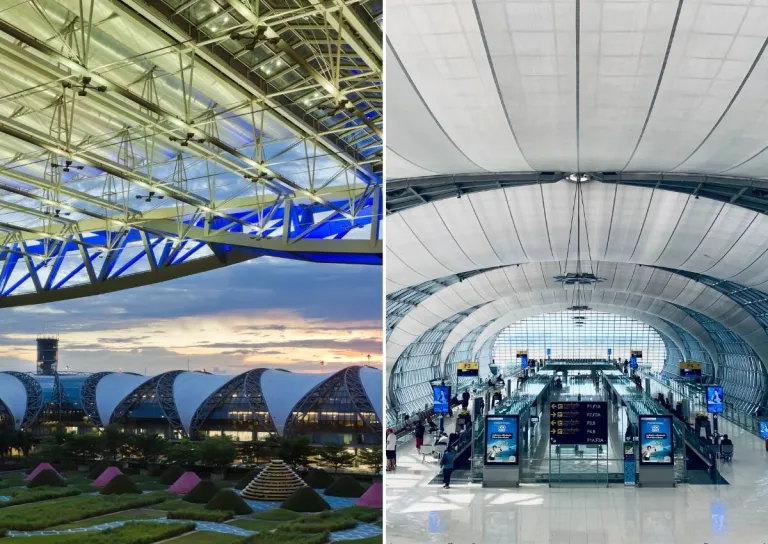Our favourite places to stay on this sleepy Cebu island.
Thailand Implements Facial Recognition at Six Airports

Thailand is stepping up its travel tech game by implementing facial recognition in six of its busiest airports. Starting 1 Nov 2024, domestic passengers will be the first to experience this streamlined, biometric check-in process, with international travellers following suit on 1 Dec 2024. This new automated system, introduced by Airports of Thailand (AOT), allows passengers to show their physical ID only once, completely eliminating the need to repeatedly present boarding passes.
Also read: The Impact of Thailand's Rising Costs to Budget Travellers
What travellers need to know about Thailand's facial recognition airport system
 Image credit: (L-R) tomgigabite, Belle Shang via Canva Pro
Image credit: (L-R) tomgigabite, Belle Shang via Canva Pro
The six airports rolling out the facial recognition system include Suvarnabhumi International Airport, Don Mueang International Airport, Chiang Mai International Airport, Mae Fah Luang/Chiang Rai International Airport, Phuket International Airport, and Hat Yai International Airport. To use this system, passengers will be prompted to consent to identity verification at either the staffed check-in counters or self-service kiosks. Once completed, travellers’ biometric and travel details are digitally stored, allowing seamless transitions from baggage drop-off to boarding gate—no passport or boarding pass required. However, each check-in registration only applies to the single journey at hand, ensuring security and privacy standards.
Kirati Kitmanawat, director of Airports of Thailand, expressed that this initiative will save passengers valuable time during the verification process, providing them more freedom to relax, shop, or dine before their flights. He explained that modernising airport infrastructure is a major priority for AOT, emphasising the organisation’s commitment to becoming a world-class airport operator.
This high-tech upgrade comes in response to the growing numbers of passengers travelling through these airports. Over the past year, AOT reported handling approximately 11.29 million passengers across the six hubs, a nearly 20% increase from the previous year. Among these were 72.67 million international passengers, with travellers predominantly arriving from countries like China, India, South Korea, Russia, and Japan. During the same period, the six airports collectively handled 732,690 flights—a 14.5% year-on-year increase.
Also read: Thailand Ends Visa-Free Travel for Asia and Australia Starting December 2024
The introduction of facial recognition technology is expected to accommodate the anticipated rise in passenger numbers, providing a more efficient, hassle-free travel experience. As AOT moves toward its goal of becoming a premier airport operator, this biometric innovation marks a significant step toward elevating Thailand’s airport standards, making travel both faster and more enjoyable. So, if you’re planning a trip to Thailand in the coming months, get ready for a futuristic experience as you breeze through security with just a smile!
Featured image credit: Dmitri Pronchenko via Canva Pro
Published at
About Author
Anne Mercado
Subscribe our Newsletter
Get our weekly tips and travel news!
Recommended Articles
10 Bantayan Island Resorts, Hotels, and Rentals for Your Tropical Escape 10 Best Mountain Cafes in the Philippines for Your Peak Coffee Experience Coffee date on the mountains, anyone?
10 Family Outing Ideas in Metro Manila Under ₱500 Looking for a weekend bonding with the family under ₱500? Head to these places, pronto!
10 Long Weekends in the Philippines in 2023 Book those flights ASAP.
Top 10 Post-Breakup Destinations for Healing and Self-Rediscovery Ready for a solo travel?
Latest Articles
Dingalan Travel Guide: Nature Spots to Discover Now Underrated coastal gem in Aurora
What to Eat in Bicol: Iconic Dishes and Treats, and Unique Pasalubong You’ll Love Spice up your foodie adventure with iconic Bicol dishes and must-try pasalubong!
Top Travel Trends in the Philippines for 2025 New spots, tips, and trends
New UK Adventure Park to Visit in Devon and Cornwall Fun countryside escape near London
Ultimate Camarines Norte Travel Guide: Waterfalls, Beaches, and More From surfing to secret waterfalls, Camarines Norte is your next escape!

